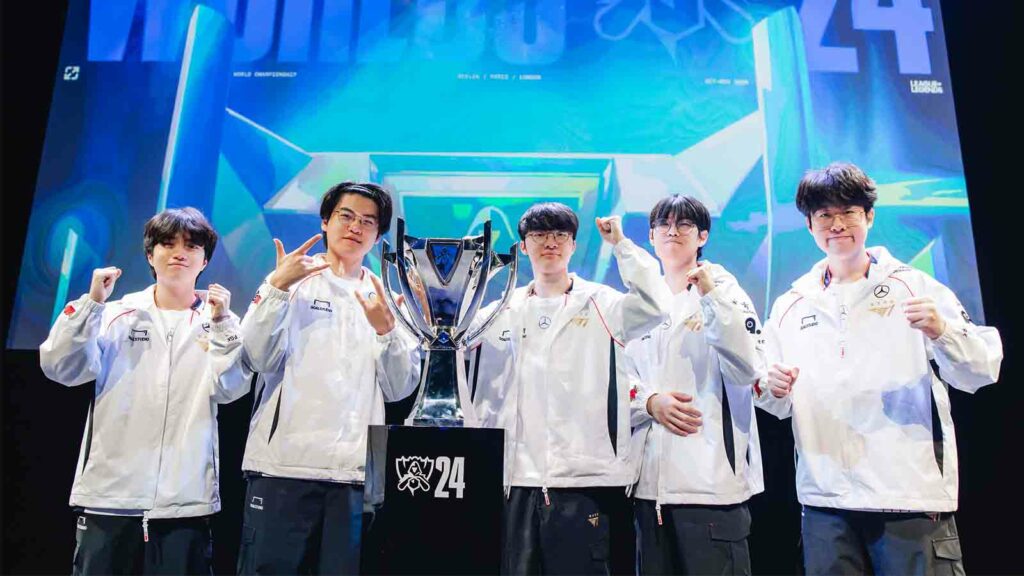• 03 Nov 2024
Perseverance
Constancy
League Of Legends
T1
What some LoL players can teach us.
Lessons of effort, confidence and perseverance in League of Legends

T1: A Legacy of Resilience and Adaptation
As a competitive League of Legends team, it has had its ups and downs over the past 3 years. However, the T1 team has a legacy of resilience and adaptation. Founded in 2012 as SK Telecom T1, the team dominated in the beginning. Its players, such as Faker, became legendary for their skill and longevity in the game. Over the years, T1 has changed its roster a lot. It has tried out combinations of players to maintain its competitive edge. Although some lineups struggled, such as in 2020, T1 bounced back with remarkable performances in recent years.
A key moment was the formation of a roster that included Zeus, Oner, Faker, Gumayusi, and Keria. This led T1 to achieve high positions in the LCK and in international tournaments. In 2023, they were second in the LCK Spring and Summer. Then, they won the World Championship. This was a historic comeback and established them in esports.
T1's success is due to its star players and its ability to identify and nurture emerging talent. This allows them to create rosters that combine experience and new skills. Their legacy, popularity, and adaptability make T1 an iconic team in League of Legends esports.
League of Legends World: Worlds.
Last week, the annual League of Legends Cup, a popular 5v5 online game, came to an end. This year, the event broke global viewership records. 7 million people watched the final on YouTube, Twitch, and other Chinese platforms I'm not familiar with. (You can watch more here https://www.bbc.com/news/live/c98eyzvpplvt).
The winners were a Korean team called T1. They have been the most popular and successful team in the history of the sport for years now. This lineup is not the same as the first 3 international titles. However, it is the same as last year. Also, the team leader, Faker, has been there since the beginning. He will probably stay until he retires. Now, many, especially non-gamers, will read this. They will say, "What do I care?" But what do 20-25 year old guys care about teaching me? I think they do, and it's because they have overcome a lot of challenges on their way to where they are today.
Fighting against Korean expectations and pressure.
Let's start with some simple facts. In LOL, as in most esports, a professional player's career lasts about 3 years. There are atypical cases. There are also those who didn't last even a season. The important thing here is that T1, as it is now formed, has lasted 3 years as a team. Those champions, who have reached the final 3 times and won 2, have lasted longer in the same team than the professional life of most players.
Second, when looking at people like Faker, we have to take into account the pressure they are under. He is a well-known player, even outside of the game's fans. His name is well-known. At 28, like me, he is already past the age limit for a professional player. You need to have good energy and reaction speed to play. Many don't believe it, but you need vitality to do so. His list of skills includes a strong will and an iron mind. Why do I say iron mental strength? Well, because after winning last year's World Cup, the team was not in its best form until now, in the World Cup that just ended.
Overcoming obstacles and injuries along the way.
On the one hand, Faker had an injury to his hand. He had to sit out a month, which is terrible for a player of his level. Secondly, during both seasons of the Korean league, they suffered DDoS attacks. This prevented them from playing and practicing. Their poor adaptability to the changes in the game and their low level, compared to last year's World Cup, were evident. Despite this, the team that is not only Faker made it to the finals of the Korean National League. They obtained a qualification for this year's World Cup, occupying the last place, the fourth place. Because of this, they not only played the play-ins against lower-ranked leagues, such as those from Latin America. They were also faced with the best teams from other regions, such as China and Europe.
Now the mental part plays a very strong role in this sport. At the end of the day, games last 30 minutes. It's a game where you can die 5 to 10 times in a single game, especially if it was a bad game. All year long, they were fighting tooth and nail. They were crushed by countless teams inferior to them. Despite this situation, they came out ahead.
Third, Korean expectations in this sport are very high. Sometimes, they are even higher than in other countries. In Korea, if a player or a coach does not perform, there are protest trucks asking for them to resign. They carry pictures of them. Also, the digital pressure is scary. Being such a connected country, the media is attentive to any noise on the web. The pressure comes through trucks, protests, social media and television. So, on top of that, Faker and his teammates had to ignore it and focus on getting ahead.
Mental strategy: Setting achievable goals.
The team’s journey to the World Cup shows that in difficult times, it is key to use achievable goals to overcome challenges. Adam Grant, in Hidden Potential, mentions that scaffolding can be internal or external. External scaffolding is, for example, resources and support from a mentor. Internal scaffolding is, for example, incremental and realistic goals. These small achievements help build confidence and resilience. They are necessary to face bigger challenges and exceed expectations.
In this case, Keira showed that setting specific, short-term goals could create a sense of progress. Encouraging small goals, such as making it to the Round of 16 in the Korean league, was key. With that mindset, by making it to the semi-finals of their league, they secured a chance to make it to the World Cup. No one expected them to do so in their current form. The team thus avoided the pressure of very high expectations. Each goal thus became a stepping stone. This gradual approach helped to build morale and create a realistic perception of achievement. This strategy is useful when, at the start of the season, the team was in a difficult position with no guarantee of making it to the World Cup. However, each step increased their confidence and ability to face the next levels of competition.
T1's resilience and recovery of form.
The process they went through to get there was, in many ways, a great journey. Sometimes we set ourselves unrealistic goals, too far away. They don't even motivate us. Instead, they prevent us from taking action, because we don't have the desire to achieve them. What T1 and his team achieved was impressive. They overcame the fears that were undoubtedly in their minds. They ignored those fears and kept going.
There is a very interesting study from the NBA and then from the US hockey leagues. They studied the impact of losing a team's star player. The results were fascinating. One team lost its star player to a 6-week injury. In those 6 weeks, the team was doing poorly. They had strategies that revolved around that star player. But, when the star player returned, the teams did much better on average. The reason was that the members learned to play better with each other without depending on the star player. When the star player returned, they could leverage the new strategies with the superstar player. I think something like that must have happened to T1. His absence was in the second season, the one that matters for the World Cup. He missed 6 games, of which they lost 5. Once Faker returned, they managed to qualify and reach the semi-finals of their championship.
Sometimes we think that we cannot achieve things. We believe this out of fear of having failed before. 2 years ago, in the 2022 final, they lost to a Korean team. It was a crushing defeat. The rivals were important to many of the players. It was not a good start for the lineup. Also, little was expected from the team that won that final. The emotional component plays a huge role in sports. Unlike business, where we can sometimes think and be alone. In sports, it is the game that matters. It is often easy, in retrospect, to say “if only I had done this or that.” In every game they lost, they thought about it. After every loss, they wished they had used another strategy.
Lessons of perseverance and growth in esports.
I admire these teams a lot, especially when they win like that. I know it wasn't easy for them, not for me or anyone else. Very few expected them to win this year. Not because they weren't good, but because they weren't in their best form. It would be interesting to know what strategies they use to keep their morale high. I want to know how they avoid giving up and stay motivated when training. Also, how after losing a game, they can give their best in the next one. This year, they lost their first game by a landslide. After that, I thought there was no way they would win. But they blew me away in the next game. It wasn't an easy final. You could tell they used every bit of talent to win. But the most important thing was their perseverance. They also set themselves achievable goals to keep their motivation up.
T1 is one of the most prestigious teams in League of Legends history. They remain among the best due to their mix of experience and emerging talent. The current roster features Faker, a legend. He has been key since the team's inception. This year, the players have adapted and overcome the pressure. They have handled the ups and downs of the competition, after the difficulties of the season. Despite criticism from their fans, T1 has made it to the finals. They have shown great perseverance and focus in each game.
In League of Legends, each team has five roles: top, jungle, mid, ADC, and support. Each has a key role in the game. In T1, this structure allows each player to focus on their responsibilities. They must collaborate to create effective strategies. For example, in the mid lane, Faker controls. The jungler and support help with mobility, securing objectives, and protecting the vulnerable. Collaboration and communication are key for T1. This way, players can use their skills and adapt to the pace of the game, facing challenges together.
T1 teaches us lessons about perseverance and the power of goal setting. In the face of each season’s challenges, the team has had a growth mindset. They’ve overcome obstacles. They’ve shown that small achievements are important steps towards big victories. This resilient attitude reminds us that, in esports as in life, you have to face defeats and keep moving forward. That’s key to achieving success.
